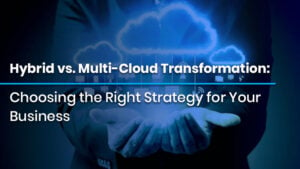
How to Strengthen Security Using CIS Controls and Posture Analysis
How to Strengthen Security Using CIS Controls and Posture Analysis Introduction In the fast-paced and ever-evolving world of cybersecurity, defending digital infrastructure goes far
Enhance your Skills in Cloud Computing , IP Networking , Microsoft , Artificial Intelligence , Cybersecurity and Many More .” Come and Join IPSpecialist.

How to Strengthen Security Using CIS Controls and Posture Analysis Introduction In the fast-paced and ever-evolving world of cybersecurity, defending digital infrastructure goes far

How to Prepare for the AWS Data Engineer Exam Introduction With the world becoming increasingly data-driven, organizations are depending on cloud-based systems to store, process,

Hybrid vs. Multi-Cloud Transformation: Choosing the Right Strategy for Your Business Introduction In the digital-first economy of today, cloud transformation is no longer a
Table of Contents
In the fast-paced digital world, cloud computing services have become the backbone of modern IT infrastructure. The ability to access computing power, storage, and software over the internet without maintaining physical hardware has revolutionized businesses worldwide. Cloud computing offers unmatched scalability, cost efficiency, and flexibility, making it indispensable for organizations looking to innovate and grow.
As businesses increasingly migrate to the cloud, understanding cloud computing services becomes essential. From Infrastructure as a Service (IaaS) and Platform as a Service (PaaS) to Software as a Service (SaaS) and serverless computing, cloud services offer diverse solutions tailored to different business needs.
Ready to master cloud computing and boost your career? IPSpecialist offers industry-leading Cloud Certification Training for AWS, Azure, Google Cloud, and Oracle Cloud. Gain hands-on expertise and advance your career with IPSpecialist. Visit IPSpecialist today!
Cloud computing is a revolutionary technology that allows businesses and individuals to access computing resources—such as servers, storage, databases, networking, software, and analytics—over the internet. Instead of maintaining physical infrastructure, users can leverage cloud services to scale operations, enhance security, and optimize costs.
Cloud computing services are on-demand access to a broad set of computing resources provided over the internet. These resources comprise virtual machines, storage, databases, applications, and development tools, all located on distant data centers operated by cloud providers.
In contrast to the conventional IT infrastructure, where organizations have to invest a lot of money in physical hardware and software, cloud computing enables organizations to pay only for what they use. This pay-as-you-go approach minimizes operational expenses but provides scalability and flexibility to conform to shifting requirements.
Let’s discuss the four main categories of cloud computing services in detail:
IaaS offers virtualized hardware resources, enabling companies to control their IT infrastructure without the need to invest in physical hardware. Users can obtain virtual machines, storage, and networks on a scalable basis.
Key Features:
Examples:
Use Cases:
PaaS provides a full development and deployment environment within the cloud. Developers can develop, test, and deploy applications without being concerned with underlying infrastructure such as servers and databases.
Key Features:
Examples:
Use Cases:
SaaS provides fully featured software applications via the internet. The applications are accessed by users via web browsers with no installation or maintenance.
Key Features:
Examples:
Use Cases:
FaaS enables developers to run code in response to events without having to care about servers. It scales automatically and bills by execution time.
Key Features:
Examples
Use Cases:
Cloud computing services provide a variety of advantages, hence being a first choice among companies across the globe:
Cloud services save organizations from capital investment in hardware and software. Companies pay as per usage, thus saving on operational costs.
Cloud computing enables organizations to scale up or down in relation to demand, providing optimal performance without over-provisioning.
Top cloud vendors spend a lot on cybersecurity features, providing encryption, identity management, and compliance with international standards.
Cloud solutions provide inherent backup and disaster recovery, providing business continuity in the event of system crashes or cyberattacks.
Cloud computing provides real-time collaboration and remote access, enabling teams to access and share information from anywhere.
Cloud providers manage software updates, security patches, and infrastructure maintenance, lessening the IT load on companies.
There are different cloud deployment models based on business needs:
The market leaders are the top cloud service providers with their wide range of offerings and enterprise-level solutions:
Choose public, private, or hybrid cloud depending on security, compliance, and operational needs.
Having multiple cloud providers avoids vendor lock-in and enhances redundancy and resilience.
Implement best practices such as identity management, encryption of data, and periodic security audits.
Utilize cost-management tools and track usage in order to optimize costs while achieving maximum efficiency.
Cloud computing services have emerged as the foundation of contemporary IT, providing scalable, affordable, and secure solutions. From IaaS and PaaS to SaaS and FaaS, these services enable businesses to innovate and expand without the hassles of infrastructure management. With the proper cloud model and best practices, organizations can tap into the complete potential of cloud computing.
As companies embark on the digital transformation path, cloud computing services lay the base for agility, efficiency, and innovation. With cloud solutions, businesses can lower expenses, improve security, and expand operations with ease. If you are a startup or an enterprise, whatever you do, the cloud provides unlimited opportunities to expand and thrive.
The principal models are IaaS (Infrastructure as a Service), PaaS (Platform as a Service), SaaS (Software as a Service), and FaaS (Function as a Service). Each suits various business requirements, ranging from infrastructure management to software deployment.
Cloud providers provide strong security features such as encryption, access controls, and compliance certifications. Businesses, however, need to also adopt strong security practices to protect their cloud environments.
It depends on the needs of your business. AWS has a wide variety of services, Azure is strong in enterprise integration, and Google Cloud has expertise in data analytics and AI. A multi-cloud strategy also offers flexibility and cost optimization.
© 2025 All rights reserved | Privacy Policy | Terms and Conditions | Sitemap | Cookie Policy




